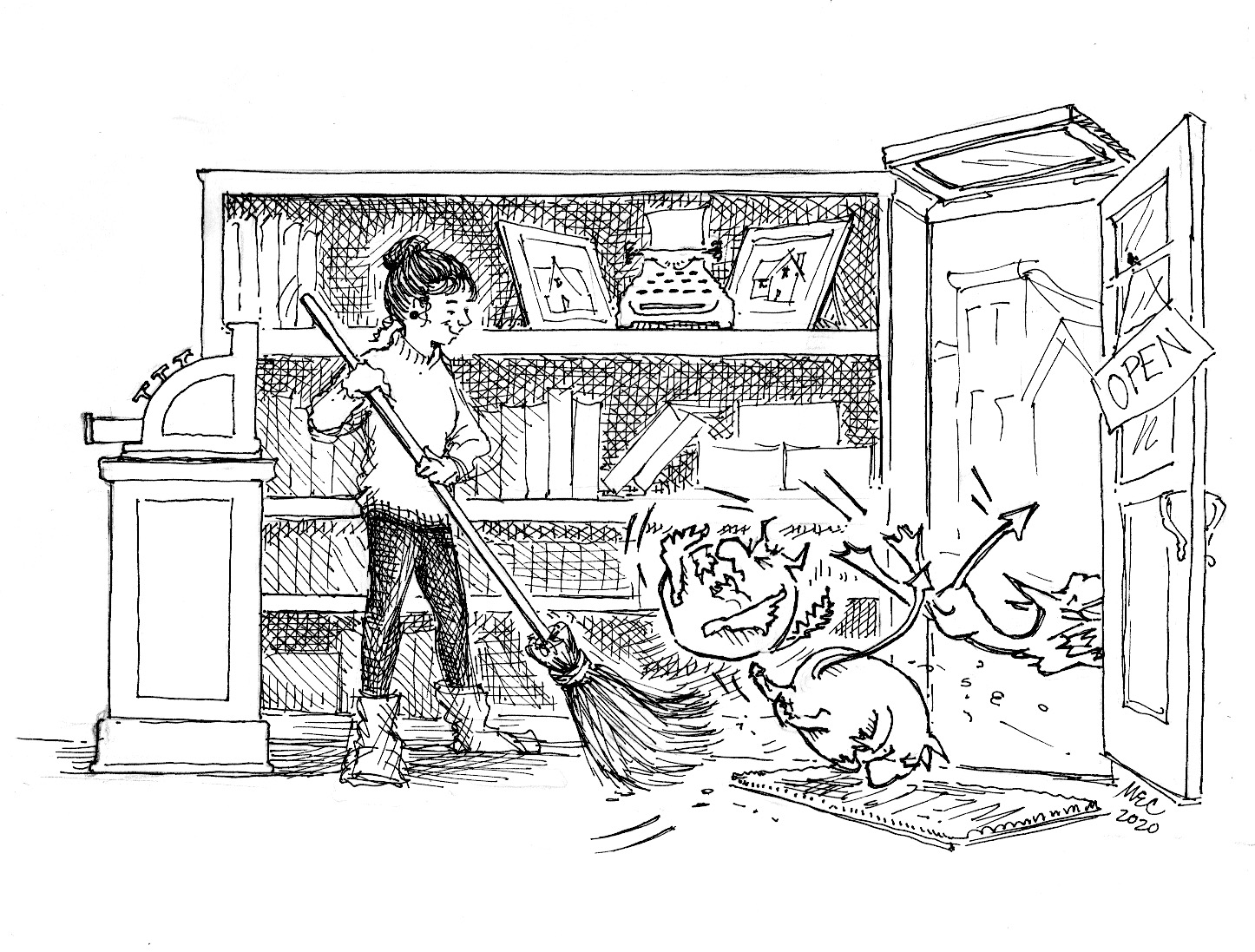 A
local antique mall went out of business not long ago. I was
sorry to see it go, as I always am when a retail venue goes
under. I like shopping - I derive from it what some people get
from hunting.
A
local antique mall went out of business not long ago. I was
sorry to see it go, as I always am when a retail venue goes
under. I like shopping - I derive from it what some people get
from hunting.In this case, I wasn't surprised at the failure, because: every time I had purchased something there, I'd encountered some sort of roadblock at the checkout counter. Their card processor was slow, the proprietor explained; she couldn't contact that vendor about their price, they were never available; she didn't know where she might find that book; the stated 50% off didn't apply to that item; she was too busy to clean up the mess in the back booth. I heard her do the same with other customers. Each impediment she offered was a socially acceptable excuse, but the aggregate left an impression of unwillingness to do business. The sales counter was not an approachable place. It felt as if the proprietor's self-importance was more important than the sale. My purchases were small and I have a tendency toward thriftiness that can surely be annoying, so I need to consider the part I played in less-than-satisfactory transactions, but the situation got me thinking.
Business is a microcosm of life. Because money is involved, theories fly out the window and the rubber meets the road. Any business that stays in business does so for a reason; it can't survive on wishful thinking and an idea about what people ought to buy and how customers ought to behave, on a business owner's private agenda and pet peeves. It needs to be open to business. The savvy store owner will notice what sells and adjust accordingly, perhaps putting favorite stock back in the storeroom and ordering more of those tacky socks that actually sell. He'll hunt for the last bean or button to complete a small sale, he'll observe and respond helpfully to a customer having a bad day. But he'll take that action because he's open to noticing. (A favorite theme of mine.) He will notice because of a disposition to be open. He - or she - doesn't use every transaction to advance their own agenda.
Many years ago, I was brusque to a young man who interrupted a meeting in which, by a fluke, I was a leader. Another member of the committee, when the young man had left, spoke to me about the importance of being approachable. In this case, I'd been unapproachable because of an inflated sense of my own importance, which hurt the business of the committee.
I frequent another store where every purchase takes twenty minutes because every item in the store reminds the checkout guy of a personal anecdote that must be told. I enjoy most of his stories, but, in my opinion, he's not serving the store well because he's not really open to the customer's need to move on, and, therefore, to the store's needs. In that way he, too, is unapproachable. The need of the other party doesn't get through to him.
A friend had a life catastrophe recently, one that might never have occurred had people been able to tell him some obvious things - but this particular friend puts up a wall of words that undermine conversation, let alone advice on a touchy topic. He's one of those people with whom you can't get a word in edgewise, a technique I recognize because I've used it to keep myself safe from things I didn't want to hear. This friend isn't open to hearing things that might have helped avert disaster.
Approachability. It's a thing, an issue of the heart. I keep people away when I feel threatened, or when I'm so full of myself I think they don't matter. And it's a HUGE issue between me and God, in going about His business. Many of us who complain we never hear from Him should think through just how approachable we are. Is it possible for Him to tell me the things I may not want to hear? Do I have a list of excuses that explain why I can't do business with Him today? Do I pour out a string of complaints and call it prayer? (I know, the Psalms are full of King David's complaints, but he somehow turns them around by the last verse of the Psalm. Check it out.)
I used to think that, because I am nice and people usually like me, I had a heart open to God. This isn't true. Niceness and approachability don't correlate. Quite the opposite, sometimes - being nice was often my way to protect myself from being told things I didn't want to hear, or having to do things that interrupted my plans. I was closed off to correction, and it kept me from growing.
A business fails to grow if the owner's agenda is somehow askew from the customer's. Like the antique store owner with barriers to every transaction, like the chatty checkout guy, like self-important me in my committee. If I have issues - a bad day, a worry, a resentment - that steal my attention from the transaction at hand, I fail to do business well. I need to scrub my heart clean, daily, of grievances and worries and egotisms that gum up my interactions. See illustration above.
 Being approachable means being willing to
notice the needs and preferences of my customers, and to
respond.
Being approachable means being willing to
notice the needs and preferences of my customers, and to
respond. I got the idea for this art in the middle of the night. The time I'm best at listening is around 2:30 a.m.. I'm at my most approachable. I have no agenda and no to-do list. Sometimes I have some extra caffeine at bedtime, just to facilitate my own approachability - I know I'll wake up at 2am to spend time with God. I'm trying to learn to do the three activities shown: to wait on the Lord, to linger in His presence, to abide in Him. We are all rightfully in His business, after all, and do well to be open to His input. The only way I know to do that is to spend time, precious time, being open to His input.
In short, to be approachable.
The art below was a commission, but fits this topic, so I venture to include it. Let me know if you'd like to commission a favorite verse or quotation. I'm approachable.

Click here to read more of my blog posts.